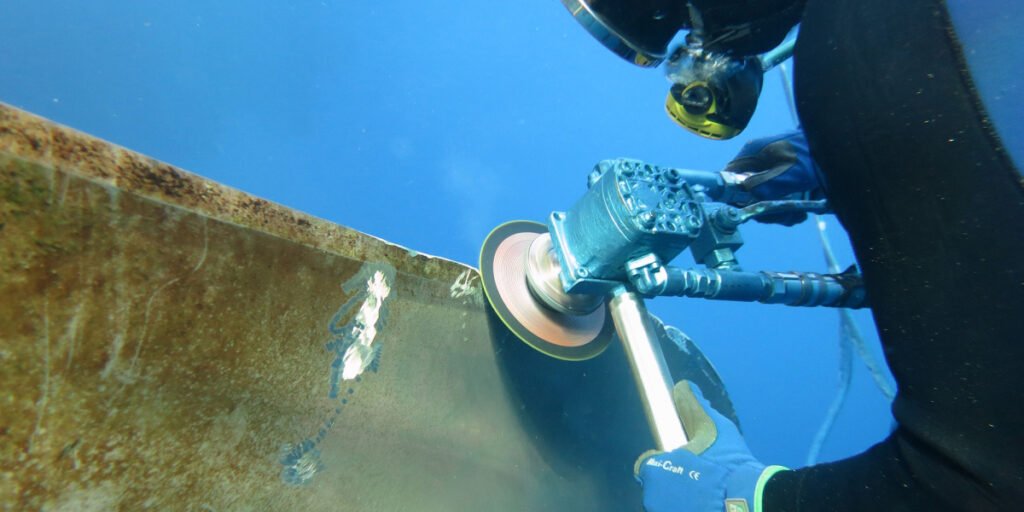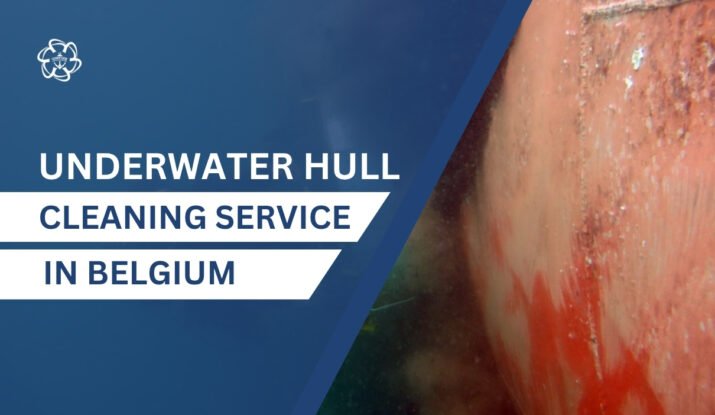Underwater Hull Cleaning in Belgium. In today’s fast-paced maritime industry, where time, cost, and sustainability are critical, shipowners and operators must continually seek methods to maintain vessel performance. One of the most overlooked yet impactful maintenance services is underwater hull cleaning in Belgium. A leader in innovative marine solutions has recently expanded its expert underwater hull cleaning services to Belgium, providing an essential solution that promotes fuel efficiency, minimizes environmental damage, and supports compliance with global maritime regulations.
Biofouling, the buildup of marine organisms such as barnacles, algae, and mussels on the submerged parts of a vessel, significantly reduces a ship’s hydrodynamic efficiency. As this accumulation increases drag, ships consume more fuel to maintain the same speed, leading to inflated operational costs and higher carbon emissions. Underwater Hull Cleaning in Belgian ports such as Antwerp, Zeebrugge, and Ghent, shipowners now have access to reliable, eco-conscious, and cost-effective hull cleaning solutions designed to keep their fleets in peak condition.
The Critical Importance of Underwater Hull Cleaning in Belgium
When it comes to the performance and longevity of marine vessels, hull cleanliness plays a crucial role. A fouled hull creates increased resistance in the water, which means the engines have to work harder to maintain cruising speeds. This results in elevated fuel consumption, increased greenhouse gas emissions, and accelerated wear and tear on engine components, ultimately shortening the vessel’s operational life. Studies show that moderate biofouling can result in a fuel penalty of up to 15%, a number that grows rapidly with more severe infestations.
Aside from financial losses, biofouling introduces ecological risks. When ships travel across different regions, they can unknowingly carry invasive species from one marine environment to another. This has led to significant disruptions in local ecosystems worldwide. In this context, regular underwater hull cleaning is more than just a maintenance task—it’s a proactive step toward responsible, sustainable shipping.
Hull cleaning also supports compliance with international environmental protocols, such as those set by the International Maritime Organization (IMO). Port authorities around the world are increasingly enforcing regulations on hull cleanliness to prevent the spread of invasive species and to reduce pollution. Vessels arriving at Belgian ports are subject to inspection and may face delays or penalties if they fail to meet these requirements.
Why Underwater Hull Cleaning is Important in Belgium’s Maritime Landscape
Cleanship has earned a reputation as a trusted partner for underwater hull cleaning thanks to its emphasis on innovation, safety, and customization. In Belgium, a country with some of Europe’s busiest ports and waterways, Cleanship is setting a new standard for hull cleaning excellence.
Their proprietary cleaning technologies employ advanced brush-cart systems and high-pressure tools capable of removing even the most stubborn marine growth without damaging the hull’s protective coatings. These non-abrasive techniques are essential for preserving expensive antifouling layers, which play a key role in preventing future biofouling.
The company’s services are also rooted in sustainability. Why Underwater Hull Cleaning in Belgium Maritime Landscape uses environmentally safe, IMO-approved cleaning solutions that do not harm marine flora or fauna. These eco-friendly practices are vital for operations in ecologically sensitive regions like the North Sea, where marine biodiversity is already under pressure from industrial activities and climate change. All cleaning operations are carried out in compliance with Belgian and EU environmental regulations, providing peace of mind for clients and regulators alike.
What truly differentiates Underwater Hull Cleaning in Belgium? It is a customer-centric approach. Recognizing that no two vessels are the same. Whether it’s a cargo vessel, a container ship, or a cruise liner, the company’s technicians conduct a thorough assessment before cleaning, ensuring optimal results every time. Clients also receive comprehensive reports, including photographic documentation of the hull’s condition before and after cleaning—a level of transparency that fosters trust and ensures accountability.
Comprehensive Marine Services at Key Belgian Ports
Underwater Hull Cleaning in Belgium present in Belgium, spans major maritime hubs, including the Port of Antwerp, the Port of Zeebrugge, and the Port of Ghent. These ports are vital gateways for trade and transport in Europe, handling millions of tons of cargo annually. In such high-traffic environments, maintaining vessel readiness is non-negotiable, and Cleanship rises to meet this challenge with a suite of marine services.
The company’s core service, underwater hull cleaning, focuses on restoring the vessel’s smooth surface to improve hydrodynamic performance. By eliminating drag-inducing organisms, ships can sail more efficiently, reduce voyage times, and lower their carbon footprint. This not only improves operational economics but also aligns with sustainability goals.
In addition to Underwater Hull Cleaning in Belgium, Cleanship provides propeller polishing—a crucial service that enhances propulsion efficiency. Even slight imperfections on a propeller’s surface can disrupt water flow, decreasing thrust and increasing energy demands. With Cleanship’s polishing service, propellers are restored to peak condition, translating to smoother sailing and measurable fuel savings.

Underwater inspections round out the company’s offerings. These assessments are essential for identifying structural issues, cracks, or corrosion before they escalate into costly repairs. Using high-definition underwater cameras and remotely operated vehicles (ROVs), Cleanship’s technicians perform detailed diagnostics and share findings with clients in easy-to-understand formats. This empowers shipowners to make informed maintenance decisions and avoid unexpected downtimes.
The Long-Term Benefits of Underwater Hull Cleaning in Belgium
Underwater Hull Cleaning in Belgium is more than a tactical decision—it’s a strategic investment in long-term maritime success. The most immediate benefit is the significant improvement in fuel efficiency. Clean hulls and polished propellers minimize resistance, enabling ships to travel faster using less energy. This directly translates into reduced fuel bills and a smaller carbon footprint, which is essential as the maritime sector moves toward decarbonization.
Underwater Hull Cleaning in Belgium services also contribute to enhanced vessel performance. Cleaner hulls enable better maneuverability and responsiveness, crucial for navigating busy ports and tight waterways. This performance boost is particularly beneficial for container ships and cargo vessels that operate on tight schedules and require optimal handling.
Perhaps most importantly, Cleanship ensures full regulatory compliance. Their adherence to IMO standards, local Belgian environmental laws, and best industry practices positions clients for seamless port entries and fewer regulatory hassles. In an era of increasing scrutiny on maritime emissions and ecosystem health, working with a certified and eco-conscious provider a clear advantage.
Conclusion
Underwater hull cleaning services in Belgium offer a crucial solution for shipowners and operators striving to improve vessel performance, reduce fuel consumption, and stay compliant with maritime environmental standards. With cutting-edge equipment, eco-friendly practices, and a team of skilled professionals, Cleanship ensures efficient, safe, and regulation-compliant cleaning across key Belgian ports and Ghent.


